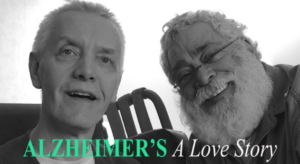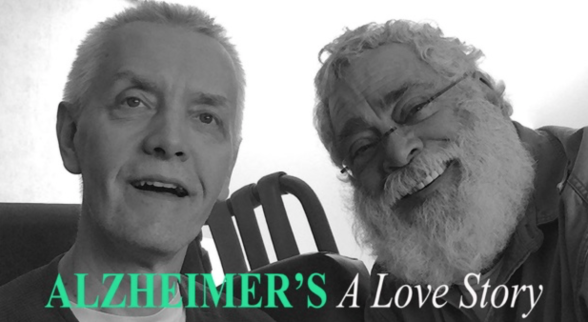 Many of our DAI members or their families are needing additional love and support at this time due to serious or critical illnesses they or their family or their partners are facing.
Many of our DAI members or their families are needing additional love and support at this time due to serious or critical illnesses they or their family or their partners are facing.
To highlight that love is still so important, and can still be found even when dementia enters a person or couple's world, we are sharing a blog today by Michael Horvich, who was a care partner for his beloved partner Gregory. This is his speech from ADI Chicago, where he also showed his multi-award winning video called "An Alzheimer's Love Story".
AN ALZHEIMER’S LOVE STORY
By Michael Horvich © 2018
PERSONAL
My name is Michael and the story I am about to share with you is a very personal one. I’m comfortable with crying in front of you, however it is very difficult to cry … and talk at the same time.
So, if I get choked up, I will pause, take a few deep breaths, and be right back, probably before you even notice I have gone.
GREGORY, my husband of over 41 years, was diagnosed with DEMENTIA, most likely ALZHEIMER’S, in the 29th year of our relationship. He was 55 years old.
NOT AN EXPERT
Let me say that I am NOThere today as an EXPERTin the field of Dementia and Alzheimer’s …but rather as someone who has EXPERIENCEDit … DIRECTLY,INTENSELY.
ABOUT MICHAEL
Let me tell you a little about me …I am an educator, have worked with children in regular education as well as children with special needs, was an administrator for a Talented and Gifted Education Program,taught Junior High Spanish, and taught a number of university level education courses and seminars.
I havebeen retired for 20+ years but have been more than active as an educator, speaker, writer, poet, blogger, actor, opera supernumerary, children’s museum curator, flea circus ringmaster, and dementia /Alzheimer’s caregiver partner.
ABOUT GREGORY
Gregoryearned a BA at Wesleyan University in Connecticut and received his Master’s Degree from Harvard University where he studied Architecture, with Phi Beta Kappa recognition.
He ran his own high end architecture and interior design firm and served as architect of record for renovations at the Baha’i National Shrine in a suburb of Chicago, Wilmette, Il.
Gregory was a writer, an artist, was well versed in music and art history, was a concert level pianist, spoke French, and won many awards for his architecture and interior design skills.
THE DIAGNOSIS
Gregory and I walked the Dementia / Alzheimer’s path together for 12 years.
He was NOTa VICTIMof Alzheimer’s ... but rather a HERO.
I might add that we lived as WELLas possible with dementia, refusing to accept the diagnosis as a “DEATH SENTENCE.”
I NEVERreferred to the diagnosis as HISbut always OURdiagnosis.
We were relieved on receiving the diagnosis because now we had an idea of what we had been experiencing & and could prepare for the future
... although at the time we did not really understand the nature of the roller coaster ride we would be on until his death.
As you know, Dementia /Alzheimer’s is not just a memory problem! It includes cognitive issues as well as physical, mental, physiological, psychological, social, emotional, medical, etc ... and is complicated by the many ways in which it expresses itself, usually differently for each person affected!
NOT A DEATH SENTENCE
The times were not easy, but we persevered and did a good job! I was able to keep him safe and to support him by helping him to be free of daily worries, responsibilities, and fears.
I was able to help him COMPENSATEfor his disappearing abilities while always trying to make sure that the respect and communication which had defined our relationship never faltered.
MEDICAL ASPECTS
The DOCTORSwere able to RULE OUTwhat was NOTgoing on, butbeing a PROGRESSIVE, INCURABLEdisease, what were they REALLYable to do during those EARLYstages except confirm my existing observations?
They wereable to prescribe drugs like ARICEPTand NAMENDA, which are purported to slow down the disease, but how does one measure … “SLOW DOWN” and against what baseline?
NEW SENSE: FAMILY & HOME
Instead of spending time MEDICALIZINGour experience, I worked very hard at CREATING A NEW SENSE OF FAMILYandHOMEandRELATIONSHIPto fit Gregory’s changing needs.
For the most part he dealt with the disease in his usual CALMmanner and at a certain point the Alzheimer’s created a BUFFERwhich kept him from being fully aware of the changes through which he was going.
YES, there were times when he became depressed, sad, frustrated, and fearful but most of the time he was content and happy. The same YING AND YANGwas true for me!
Fortunately, I was retired and had all the time in the world for him … and for us.
CAREGIVINGTEAM
In the beginning, I REFUSEDto refer to myself as Gregory’s CAREGIVER… out of RESPECTfor not wanting to diminish him to the role of being my “PATIENT.”
I remember thinking “If the disease would only stop progressing at this point I would be content.”
PROGRESS
But PROGRESSit did … and the RESTING, level periods were shorter and the need to re-think and re-establish NORMALCYcontinued … sometimes on a daily basis … sometimes hourly.
Sometimes Gregory’s PERCEPTIONof … and INTERACTIONwith the world … was so confused and disoriented that I not only didn’t know how to SUPPORThim … but I didn’t know how to INTERPRETwhat he and/or I were experiencing.
Being able to monitor and provide for Gregory’s increasing needs, in a RESPECTFULunderstanding way, yet not letting him become overly frustrated was more and more difficult.
But we did not give up!
Family and friends were available but they had lives of their own and even though they tried, they couldn’t REALLYunderstand what I was going through.
I made sure that our daily life was full and rich and meaningful. Our life was filled with much laughter as well as many tears; joy, as well as sorrow. Above all, it was filled with LOVE& TRUST.
I had all of our legal arrangements in order, and being a same-sex-couple, before marriage was legal in the United States, we also had to have all types of special “permissions” and “protections” in place.
We closed Gregory’s business and our time was now our own. Our love continued to grow.
We enjoyed our condo and living in a very active Downtown Evanston, Illinois.
We entertained, enjoyed family and friends, ate out, cooked at home, went to the opera and theater events, and we were buoyed up by our pets with their unconditional love.
We traveled in the U.S., Europe, and Mexico.
We were able to simplify our life, only keeping the most meaningful parts.
My ROLE in providing our life experiences INCREASEDmore and more over time.
We continued to be compassionate with each-other, ourselves, and those around us.
As the Dementia progressed and we were no longer able to discuss our experiences or difficult exchanges, I turned to my computer to write.
This helped me process my understandings, and emotions, keep family and friends up to date on our journey, and share with others who might tune into the blog.
Check out my web site, HORVICH.COM, for links to my Alzheimer’s BLOG, my writer’s BLOG, as well as my other projects.
You will ALSOfind a link to a 15-minute documentary, ALZHEIMER’S: A Love Story,about Gregory and me which was made towards the end of his life.
It has been accepted to over 90film festivals worldwide and won over 35awards including two from the American Pavilion at the Cannes Film Festival. That’sHORVICH.COM.
LIEBERMAN CENTER
Gregory was at home for 10+ of his years living with dementia. Then Gregory’s medical and physical needs became so great during his last year and a half, that short of turning our home into a fully staffed 24/7 hospital ward, I was not able to provide for his needs.
I found an excellent memory care facility 10 minutes from home. I could easily visit every day.
I felt some GUILTat having to move Gregory to a memory care facility … but his new sense of community and belonging, the safe clean environment, the delicious meals, the medical support, and the presence of many people around him were all positive attributes of my decision and contributed to his well-being.
I hired a day care worker to support Gregory’s physical, as well as social/emotional needs since nurse assistants in most care facilities do not have enough time to meet all the needs of all the residents.
We were very fortunate to be able to afford the extra care for Gregory.
I played an active role in determining Gregory’s health care, the facility always respected my wishes as well as helping me to understand best practices.
Admittedly, it is easier to talk about our journey IN LOOKING BACK… when compared to the overwhelming, seemingly impossible ordeal, and sometimes HELLit was to be living with and supporting Gregory through the Dementia /Alzheimer’s while MAINTAINING MY OWN SANITY. Keeping a positive outlook was not easy but always helpful!
HOSPICE
Hospice joined our team and worked hand in hand with the memory center for the last 9 months of Gregory’s life.
I am GRATEFULto this day for the medical help Hospice provided for Gregory but also for helping MEto understand the nature of Dementia’s trajectory and in the end, the process of dying.
PREPARING TO DIE
One day in early October 2015, I received a call from Hospice informing me that it looked like Gregory was preparing himself to die.
He was non-responsive for three days.
The night before he died, I crawled onto the narrow bed next to him. I hugged him and whispered, “Leave when you are ready. Don’t worry about me. I will miss you, but I will be OK.”
If he needed it … I gave him PERMISSIONto die. I had done this several before.
Now here is what I call the MIRACLE, and Gregory’s FINALGIFTto me. I kissed him goodbye on his open mouth three times, on the third kiss, having been non-responsive for three days, in a COMA, Gregory opened his eyes briefly and kissed me back.
On the next day, October 4, 2015, Gregory died.
GRIEF
GREAT LOVEmeans GREAT GRIEF. I will always grieve at some level the loss of the love of my life, but that love also carries me forward
as I continue to live a meaningful, useful life, and as I support others facing similar experiences.
FINAL COMMENTS
Gregory and my journey with Dementia was the most challenging, painful, frightening, confusing, and frustrating YETloving and liberating experience we have ever encountered.
We SUCCEEDEDin getting through it with DIGNITY. We were not always at our best ... but done with LOVE, KINDNESS, UNDERSTANDING, REPECT and FORGIVENESSit was a time of RENEWEDLOVE, CREATIVITY, & many
UNEXPECTED GIFTS.
My goal in sharing Gregory’s and my story with you is to let you know, “You are not alone. It will be difficult but you can do this!”
THANK YOU!
ADI 34th Bibliography B-1
